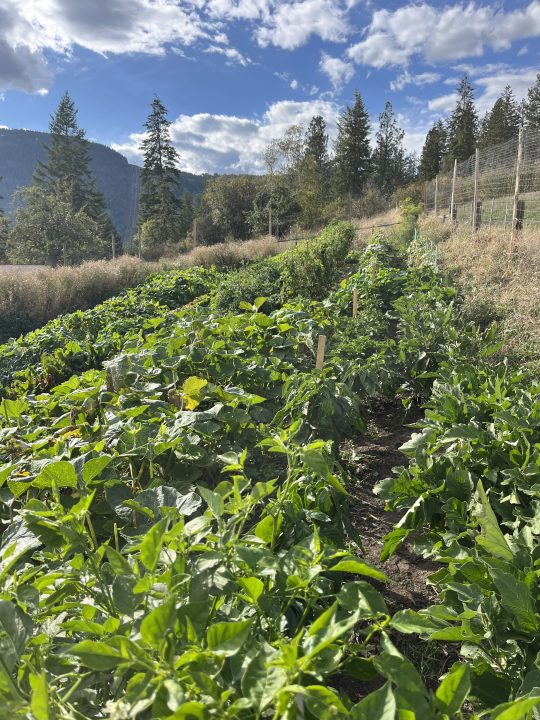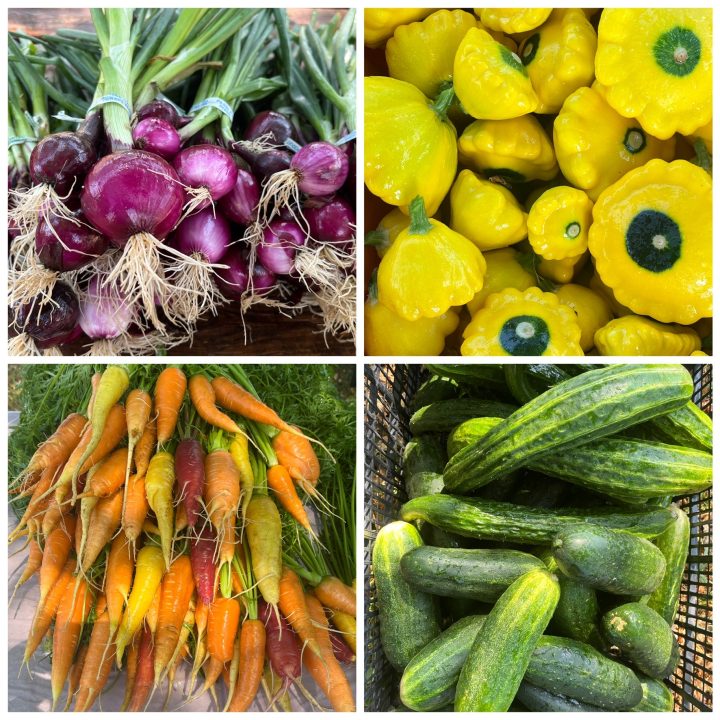Young Agrarians is celebrating the eleventh year of the Business Mentorship Network (BMN) program in BC and the third year of the program in the Prairies! The BMN offers farm business mentorship to a diverse array of new and young farmers. The mentorship is offered over the course of a year. Through one-on-one mentorship, peer networks and online workshops new farmers develop the skills necessary to operate ecologically sustainable and financially viable farm businesses.
Mentee applications for the 2024/2025 program close October 31st.
Mentees Apply here!
Mentor applications (paid position) are accepted year-round.
Mentors Apply here!
Check out the Business Mentorship Network page for more information!
Check out one Mentee’s story below and how the BMN made a contribution to the success of their farm. Want more? Head over to our BMN Blog for more mentorship stories.
Meet a Mentee: Laara Sadiq of lovebowl farm
My name is Laara Sadiq and I operate lovebowl farm, occupying the traditional and unceded territory of the Secwépemc ( Armstrong, BC). I was mentored by Kimi and Kareno at Sweet Digz Farm.
Season 1.
What a year it’s been. A labour of love. Humbling and empowering in equal measures.
I don’t quite know how to articulate the experience. I’m a performing artist by trade, and I think I farm because it engages my whole being – body, mind, heart and soul – in the same way that storytelling does. The only way that I can figure telling the story of this farm is by starting with what’s right in front of me now and rolling back from there.
October: On this cool grey day, my fields look very different than they did in the hot flush of summer. Collapsing the spent beds and sowing cover crops (thank you SPEC for the seed, and my sweetheart for transporting it from the coast). Breaking ground for a new Allium field – Garlic’s in. Seed stock ordered for next year (thank you West Coast Seeds for the 40% off sale & BC Eco Seed Co-Op for kick-ass varieties). Getting my bees ready to overwinter.
September: Winding up my CSA program. 12 weeks of Harvest Boxes filled to the brim with a riot of veggies and medicinal flowers. 10 happy families. Regular Monday morning deliveries to the Armstrong Food Bank (thanks to my amazingly supportive CSA members and friends, for your faith in me). Fall public market on the farm. And my vehicle dies – an unexpected doozy that wasn’t in the year one budget. With the precious reserves and a little help from my aunties in Toronto, lovebowl farm is now the proud owner of a very old but reliable Ford f-150 pickup. I need a freakin’ stepladder to get in, but I love it. 
August: Tomatoes! Harvesting. Weeding. Harvesting. Weeding. Will the Cukes and Scallopinis please stand down? The Hullcar Mountain Wildfire. Watching it blaze every night for a week from my back veranda, truck packed, wondering if all my eggs will still be safe in the basket by morning (deep gratitude to my Pyott Road neighbours, our incredible local firefighters, DC).
July: More harvesting and weeding. Succession planting. The soil is healthy and the field is exploding with goodness. Too hot in the greenhouse, seedlings have taken up residence in whatever shade is available. Trellising the Tomatoes and Cukes. Florida weaving the Peppers. One delicious weekend off, followed by one week of Covid…of course.
June: CSA program liftoff. Pulling my first harvest of the season: Astro Arugula, Lacinato Kale, French Radishes, Mizuna, Sai Sai, Seaside Spinach, Mesclun Greens, Persian Cress, Hakurei Turnips, Red Cimmaron Lettuce, Garlic scapes, Starflower & Spanish Lavender.
May: My bees arrive from my coastal apiary. Greenhouse overflowing with seedlings. Irrigation lines laid in. First transplants. Project Love: Nursing my young crop of Zucchini starts back to health after a rocky transition into the field (thanks Kimi & Kareno).
April: Seeding up in the greenhouse. First direct seeding in the field. A sea of white row cover. Building the greenhouse and the deer proof fence (thank you Caravan Farm Theatre and Mick Harms for your hands and hearts).
March: Field prep. Tweaking the crop maps. Tracking the nighttime temps and daytime humidity. Dreaming. Patience…
Fourteen months ago: I first set foot on this land, feel a jolt go up my spine and know in my guts that this is the home for lovebowl farm (thank you Darlene and Ken Huxley – for the land, for your kindness, your unending support, and for letting me do this my way).
YA Farm Business Mentorship
So…wow. Ok. Thinking about the story of the first year of this farm, and how the YA Farm Business Mentorship fits in. Hands down, the most valuable resource from the program has been the connection with my mentors Kimi & Kareno. Full of grace and easy humour. Community minded farmers who have developed their own unique style of running their business. Aligned with similar values to my own. The program allowed me to check in with them regularly, ask questions, rap back and forth about a multitude of things as they came up. And know that, although I run this farm on my own, not for one moment am I alone.
Early in the season I had an opportunity to spend a great day with these rad women at their home and farm in Steveston. After hilarious chats and lunch, Kimi dragged out a giant flip pad, and said ‘This is your dream board. We’re gonna spend the next hour writing down all your hopes, dreams and concerns for lovebowl farm’. We talked about everything. I mean, everything. Nothing was too big or small, too stupid or far fetched for the dream board.
What hatched out of that dreaming session was a business plan that put community, egalitarianism, diversity and affordability front and centre – my cornerstones. I am a Pakistani, middle-aged, single Mama farmer with a streak of anarchy that runs through me. How and why I farm is informed by those lenses. By running the CSA program right off the farm, I was able to make and break my own rules. I got to know my lovely customers intimately. Every Sunday, they brought their kids and dogs, family and friends. Walked through the field. Chatted with each other while I loaded up their wooden crates, munched on the treats I baked with yummies from the field, and enjoyed a cold glass of seasonal botanical lemonade (sometimes with a splash from the secret bottle stashed in the harvest fridge..) They felt like real stakeholders in the farm because they were right there on the land with me. Human connection is the sauce.
That giant sheet of paper has stayed pinned up on the wall of my farmhouse all season. I look at it often, to keep myself on track, to remind myself to be bold and brave, and to keep lightness and humour in my front brain as much as possible – really helpful when the going gets tough.
All of this, supported by the mentorship program. I’m really grateful for the webinar sessions on financial planning and record-keeping. I’ll confess, I’m not very web savvy, and I’m definitely not the spreadsheet queen. All of my record keeping is done by hand in ledgers and notebooks with a calculator close by. It’s pretty analog, but it works for me. The program gave me the basic business tools I needed to craft a personalized system of record keeping and expense/income tracking. I was able to stay within my projected operating budget because I was aware of my finances in real time – a really important thing when you’re on the tightest of budgets! And hearing from the other farmers in the cohort about how they managed things was educational and often comforting.
For all the successes this year, my learning curve was steep. The transition from urban to rural land-based farming was huge. There were lessons in the field. Like discovering that the hedgerow I cultivated around the perimeter of the field to attract pollinators was great for the crops, but also provided habitat for critters that had a fondness for Eggplant flowers. That crop never bounced back. Lesson: plant fruiting crops in the inside beds, not along the hedgerow. Or panicking when I got my soil test results back because the PH was high, getting poor advice and almost making the mistake of augmenting my clean soil with something nasty. Lesson: Slow down. Do what my bees have been teaching me for years: don’t do anything until you know something. And only take advice from the people you trust (thank you Doug Saba and Karen Ageson).

My favourite moments this season?
Equipping and building the farm almost entirely from upcycled, recycled and salvaged materials. Early morning field rounds, that gorgeous light. Harvesting – the wonder and quiet joy it makes me feel. The smell of a fresh load of compost (thanks Spa Hills Farm – your stuff is the bomb). The look of delight on a customer’s face when their favourite veg showed up on the weekly harvest list posted at the farm stand. Conversations with fellow farmers – usually accompanied by a walk, a coffee, or a shared meal – the talk inevitably turning to life in general. Because what we do as farmers is so informed by who we are as human beings – it’s deeply personal. Wrestling with the garter snake who insisted on hiding out in the irrigation box no matter how many times I evicted her – I eventually won that battle. Having my very seasoned rancher landowner, Ken, walk through the field mid-season, muttering “Beautiful” under his breath. I almost cried. Well, I did – after he left. I’m a softie toughie farmer;)
Moving forward?
As I look over the past year’s records I see that my business plan can support a careful expansion in season two – one that will afford me a modest but livable income. Growing more food for a longer window, bumping up my CSA membership to feed more families and maintaining my weekly program sending food back into the community without money exchanging hands. Pushing the needle on local food security is a core value of this farm. All the years I spent raising my daughter on a single income gave me a real insight into the dearth of affordable, fresh organic food for many of us. I’m trying to change that in my own, small way. Upping my prices is not the only option. Diversifying my income sources is the ticket: developing a ‘lovebucks’ program, where folks can purchase an add-on to their CSA membership that will subsidize the existing community free food initiatives and PWYC single Mama CSA shares; growing my supply relationships with local restaurants and cafes (thanks to The Caravan, The Clove and PV Boulevard Coffee for your patronage this season); selling medicinal salves and floral teas (thanks to my rascal bees for providing the raw materials) and holding a public market on the farm once a month – these are all ways I’m looking at doing this. And I will always create space for artist collabs and fundraising events, because art matters and community is everything.
I’m incredibly grateful to the YA Farm Mentorship for welcoming me in, connecting me to the cohort, Kimi and Kareno (sorry gals – I’m pretty much in your hair for life now) and sharing resources that will help steer my little farm into the next few years. Shukriya.
If you’re curious to learn more, feel free to reach out: lovebowlfarm@gmail.com
You can also find the farm on FB: Lovebowl Farm
🤎Laara


 Filter by Popular Categories
Filter by Popular Categories